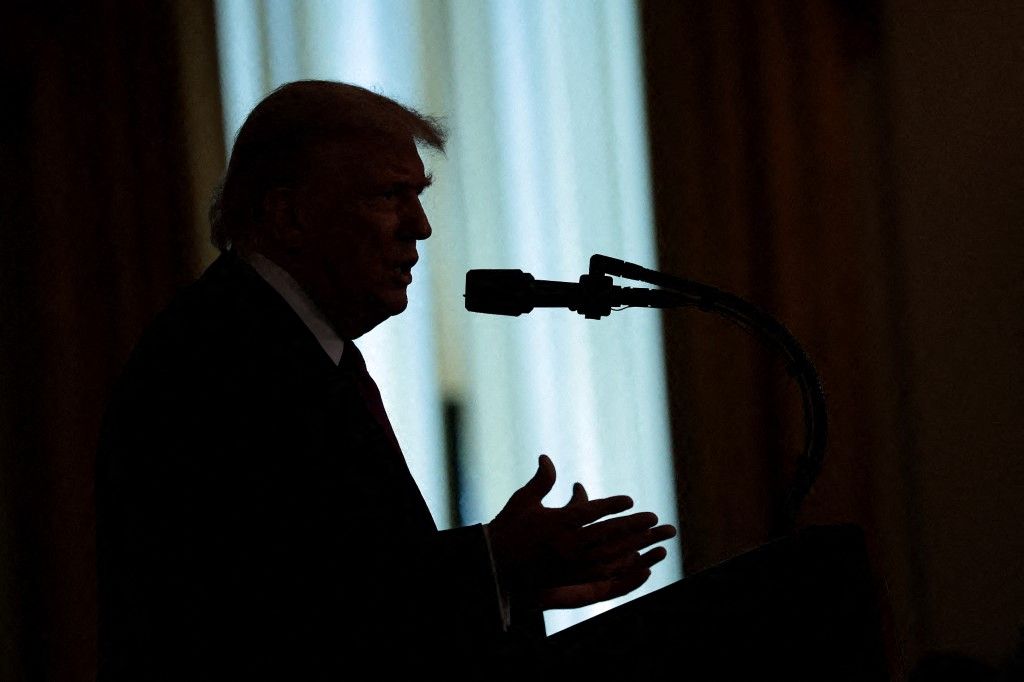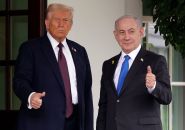- Home
- Middle East
- Attacking Iran, Israel Brazenly Defies ‘Man of Peace’ Trump

©WIN MCNAMEE / GETTY IMAGES NORTH AMERICA / Getty Images via AFP
US President Donald Trump on Thursday implored Israel not to attack Iran and declared once again his goal was to be a peacemaker.
Hours later, Israeli Prime Minister Benjamin Netanyahu, one of Trump's closest international allies, brazenly defied his advice by unleashing a major military campaign described as a "preemptive" strike against Iran's nuclear program.
The attack marks only the latest setback for Trump's lofty goal set out at the start of his second term of being a "man of peace."
Russian President Vladimir Putin, with whom Trump has also boasted a warm relationship, has rebuffed his overtures on a ceasefire with Ukraine.
And Israel resumed another massive offensive in Gaza after talks bogged down on extending a ceasefire with Hamas reached with Trump's support at the end of his predecessor Joe Biden's term.
Trump's friend and roving envoy Steve Witkoff -- who has negotiated in all three crises -- had been set to meet Iranian officials again Sunday in Oman.
Secretary of State Marco Rubio in a statement made clear the United States was not involved in attacking Iran and warned Tehran not to retaliate against US troops in the region.
Rubio said that Israel advised that it attacked out of "self-defense," but conspicuously did not say if the United States agreed. Trump, hours before the strikes, doubled down with a social media post saying he remained "committed to a diplomatic resolution" on Iran.
Netanyahu has described Iran's cleric-run government, which backs Hamas, as an existential threat and already last year ordered strikes that knocked out its air defenses.
"We've clearly seen a fork in the road in the American and Israeli approaches to this problem set," said Dana Stroul, a former senior Pentagon official who is a senior fellow at the Washington Institute for Near East Policy.
"These strikes are going to disrupt and delay and degrade Iran's nuclear program. The question, I think, is whether or not the United States and Israel in the future are going to work together on what to do to maximize the time that's put back on the clock," she said.
Stroul noted that rifts had been building between Israel and Trump, who last month agreed to remove sanctions on Syria after former Islamist guerrilla Ahmed al-Sharaa swept into power.
Trump embraced the new Syrian leader after appeals on a tour of Gulf Arab monarchies -- which have also backed diplomacy on Iran.
In Qatar last month, Trump said after meeting the emir that he believed a deal was in sight with Iran and that there would be no "nuclear dust" over the region.
Despite growing disagreements, Israel enjoys robust support in Trump's right-wing base.
The Trump administration in recent days has again taken lonely positions to back Israel, with the United States casting one of the only votes at the UN General Assembly against a Gaza ceasefire resolution and criticizing top allies, including Britain, for imposing sanctions on far-right Israeli ministers.
Justin Logan, director of defense and foreign policy at the libertarian Cato Institute, said the Israeli attack will "destroy US diplomatic efforts" on Iran and called for Trump to reject any US military role in protecting Israel from retaliation.
"Israel has the right to choose its own foreign policy. At the same time, it has the responsibility to bear the costs of that policy," he said.
But lawmakers in Trump's Republican Party quickly rallied behind Israel. Senator Tom Cotton said that the United States should "back Israel to the hilt, all the way," and topple Iran's Islamic Republic if it targets US troops.
Trump's Democratic rivals, who mostly backed his diplomacy on Iran, were aghast at Israel's action on the eve of new US-Iran talks.
"Israel's alarming decision to launch airstrikes on Iran is a reckless escalation that risks igniting regional violence," said Jack Reed, the top Democrat on the Senate Armed Forces Committee.
With AFP
Read more



Comments